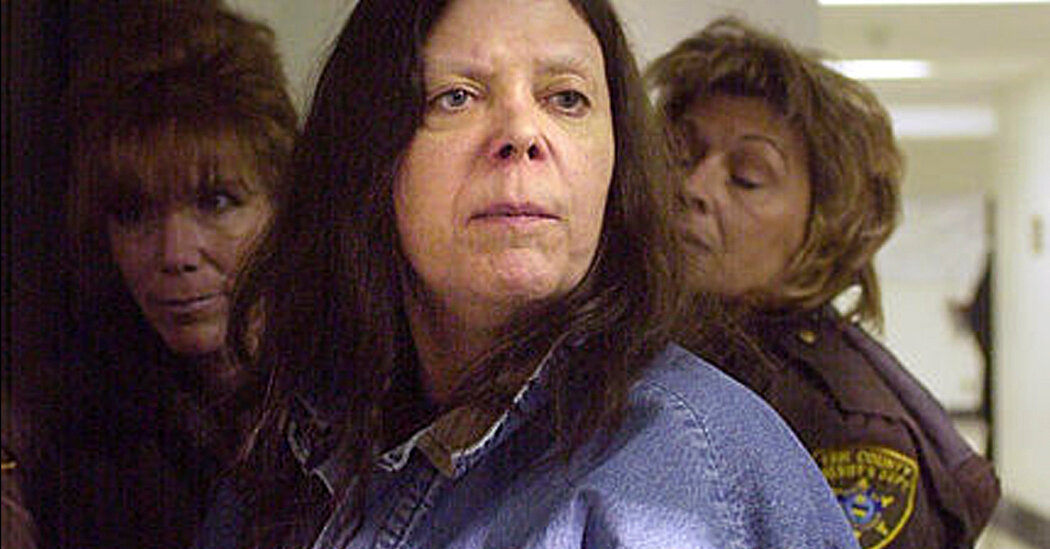
If there’s one constant across the true crime genre, it’s that women and girls do not fare well. For those of us who follow it, there’s no avoiding or softening the horrific fates that often befall them. True crime, after all, is real life. And in the United States, men accounted for nearly 80 percent of arrests involving violent crimes in 2019, according to the F.B.I.; men also made up 88 percent of the arrests in instances of murder and non-negligent manslaughter that year.
That said, there is a much smaller subset of true crime that is perhaps more gripping because it’s so rare: crimes perpetrated by women and even girls.
Here are four picks you can watch or listen to:
Television
There are over 600 episodes across 32 seasons of this Oxygen series, which has been a true crime staple since its debut in 2004. Sure, “Snapped” has all the addictively cheesy trappings of bingeable, guilty-pleasure viewing — indulgent voice-over narration, abundant re-enactments. (The tagline? “From socialites to secretaries, female killers share one thing in common: They all snapped.”)
But what this show delivers cannot be found anywhere else. Each episode explores a crime committed by a woman — crimes you probably would never have heard about otherwise, in part because they happen in America’s nooks and crannies. The stories are largely told through interviews with those involved, often including the criminals or victims themselves. And you get an entire story in about 45 minutes.
While there are some re-emerging themes — namely, women who feel trapped in their lives — the crimes and motivations are expansive. Seasons 12 through 32 are streaming on Peacock, and new episodes and reruns are broadcast on Oxygen.
DOCUSERIES
The bizarre details of the crimes at the heart of this four-part 2018 Netflix series still linger in my mind: In 2003, Brian Wells, a pizza delivery guy, entered a small-town Pennsylvania bank wearing a collar bomb and carrying a cane fashioned into a shotgun. He produced a lengthy note demanding $250,000.
Wells then failed to complete a complex scavenger hunt that presumably would have ended with a code or key to unlock the bomb affixed around his neck. News footage of him sitting on the street pleading with officers as the explosive ticks down is unforgettable. But this is just one layer of an onion that grows only more rotten.
Directed by Barbara Schroeder and executive produced by Jay and Mark Duplass, “Evil Genius: The True Story of America’s Most Diabolical Bank Heist” quickly turns its focus to Marjorie Diehl-Armstrong, the brilliant, terrifying, mentally unwell “evil genius” of the title. The life of Diehl-Armstrong, who had a string of dead boyfriends behind her, is explored in detail, uncovering a winding tale that never feels fully resolved.
Documentary
Not long ago, this strange and sad story could have been the premise for a “Black Mirror” episode. Over thousands of text messages exchanged between two Massachusetts teenagers, Michelle Carter and Conrad Roy III, from 2012 to 2014, a tragedy unfolds that culminates in Roy’s suicide and Carter’s trial for her role in his death.
In the two-part 2019 HBO documentary film “I Love You, Now Die: The Commonwealth v. Michelle Carter,” the director Erin Lee Carr does the difficult job of centering the teenagers’ mind-set. Carr fills the screen with the texts sent between them — complete with the dings and swooshes of messages coming and going. “Romeo and Juliet” is mentioned. “It’s okay to be scared and it’s normal,” reads a text from Carter to Roy. “I mean you’re about to die.”
Their exchanges, combined with courtroom footage of Carter sitting quietly as the proceedings are underway, raise all of the necessary questions. I found myself spinning in circles, turning over thoughts about accountability, coercion and the nebulous boundaries of technology.
Podcast
Over about five months in 2020, as many as 200 women who had egg-retrieval procedures at the Yale Fertility Center in Connecticut were exposed to a medical nightmare. A nurse at the clinic was stealing untold amounts of the pain medication fentanyl, swapping the liquid in the vials with saline — which was administered to the patients instead. Some of the women cried out during their procedures; others complained of pain later, while some blamed themselves, saying they had doubted their own intuition. Almost all were dismissed by those in charge, often blamed for their own pain.
“The Retrievals,” from Serial Productions and The New York Times, is reported by Susan Burton, who interviews a dozen of these patients, all of whom are grappling with what they endured. Prepare to be bewildered by how the clinic tried to brush off the ordeal as mostly harmless, underscoring how women’s accounts of their own bodies are so commonly disrespected and diminished.













